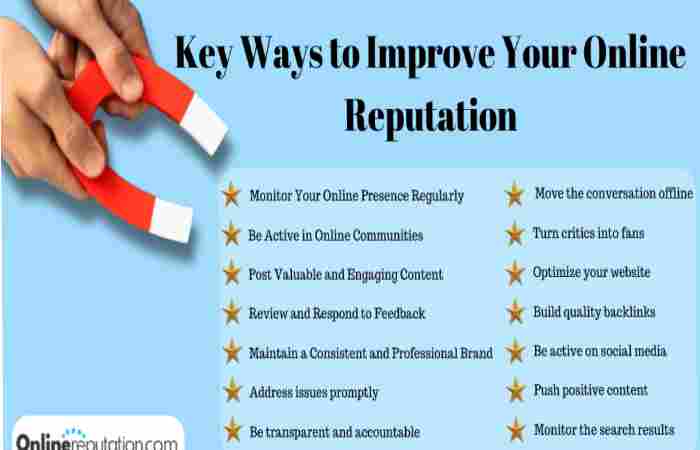3 Achievable Ways to Maintain a Good Online Reputation

In today’s world, your online reputation is just as important as your real-life image — sometimes even more. Whether you’re a business owner, freelancer, or job seeker, people Google you before they trust you. What they find determines how they see you.
So, how do you make sure that what shows up online actually represents the best version of you? Let’s talk about three achievable ways to maintain a good online reputation that anyone can follow — even without a PR team or big budget.
Why Your Online Reputation Matters
Your online reputation is basically what people think of you after seeing your digital footprint — your website, social media profiles, reviews, and any mentions of your name or brand on the internet.
A good reputation helps you:
-
Build trust and credibility with potential clients or employers.
-
Increase sales and visibility for your business.
-
Protect yourself from misinformation or false claims.
-
Open doors to new career and collaboration opportunities.
On the flip side, a poor reputation can hurt your credibility, drive customers away, and even damage relationships before they start.
That’s why keeping your online reputation positive is no longer optional — it’s essential.
1. Monitor Your Online Presence Regularly
The first step to maintaining a good reputation is knowing what’s already out there. You can’t fix or improve what you don’t see.
Google Yourself (The Right Way)
Start by searching your name or your brand name on Google. Don’t stop at the first page — go deeper. Check image results, videos, and news tabs too. You might find old content or outdated information that no longer reflects who you are.
If you run a business, Google your company name along with keywords like reviews, complaints, or feedback. This helps you understand what customers are saying.
Set Up Alerts for Your Name or Brand
Use tools like Google Alerts, Talkwalker, or Mention to get notified whenever your name, business, or keywords appear online.
For example, if someone writes a blog post mentioning your company or leaves a review somewhere, you’ll know immediately — and can respond fast.
Check Review Platforms Regularly
If you’re a business owner, keep an eye on platforms like:
-
Google Business Profile
-
Yelp
-
Trustpilot
-
Facebook Reviews
-
Glassdoor (for employers)
Monitoring helps you understand your audience’s perception and gives you the chance to respond before things escalate.
Pro Tip:
Create a simple spreadsheet to track your findings — include URLs, review dates, and whether you’ve taken action or not.
2. Respond Professionally to Feedback and Criticism
No one likes negative feedback, but how you handle it defines your online reputation more than the feedback itself.
Stay Calm Before You Reply
When you see a negative comment or review, don’t rush to defend yourself emotionally. Take a breath. Assess if it’s genuine feedback or just a troll comment.
If it’s valid criticism, see it as an opportunity to improve. People respect honesty and accountability.
Craft a Thoughtful, Professional Response
Here’s a simple formula you can follow when replying to negative reviews:
-
Acknowledge the issue:
“Thank you for bringing this to our attention.” -
Apologize (if applicable):
“We’re sorry your experience wasn’t up to expectations.” -
Offer to resolve privately:
“Please contact us at [email/contact info] so we can make things right.”
This shows that you care, you listen, and you take responsibility — all of which boost your credibility.
Engage with Positive Feedback Too
When someone leaves a positive comment or review, don’t ignore it. Reply with a simple thank-you message. This small act builds loyalty and encourages others to share good experiences too.
Handle Social Media Comments Carefully
Social media can amplify both praise and criticism. Keep your tone polite and consistent with your brand voice. Avoid public arguments — they rarely end well.
Pro Tip:
Create a standard “response guide” for your business or personal brand so that everyone on your team knows how to reply in different situations.
3. Build and Promote Positive Content About Yourself
The most effective way to maintain a good online reputation is to control the narrative by creating positive, high-quality content about yourself or your brand.
When people search for you, you want them to see professional, helpful, and credible information that reflects your best qualities.
Create Valuable Content Regularly
Start a blog, YouTube channel, or LinkedIn article series related to your expertise. Consistent posting helps push positive content higher on Google and bury outdated or negative mentions.
If you’re a brand, share stories of your customers’ success, product tutorials, or behind-the-scenes moments.
Leverage Social Media for Reputation Building
Be active on platforms that matter most for your niche.
-
On LinkedIn, share thought-leadership posts and achievements.
-
On Instagram, highlight brand culture and visual storytelling.
-
On Twitter/X, engage in industry discussions and respond to trending topics thoughtfully.
Use these spaces to build a strong, authentic voice that people can trust.
Encourage Happy Customers to Leave Reviews
Don’t be shy to ask satisfied customers for reviews. People are more likely to share negative experiences than positive ones — unless you ask.
You can do this by:
-
Sending follow-up emails after a purchase.
-
Adding a gentle “Leave a review” reminder on receipts or thank-you pages.
-
Offering a small incentive (like a discount code) for verified reviews.
The more positive reviews you have, the less impact one or two negative ones will have.
Collaborate and Get Featured
Guest posting on reputable blogs or getting mentioned in news stories can significantly boost your online image. These mentions act like digital endorsements — showing Google (and people) that you’re trustworthy.
Pro Tip:
Use SEO best practices — optimize your name or brand in titles, descriptions, and URLs. Over time, Google will associate your name with high-quality, trustworthy content.
Bonus Tip: Protect Your Privacy Online
Reputation isn’t just about what others say — it’s also about what personal information you leave exposed.
Here’s how to protect yourself:
-
Audit your old social media posts. Delete anything unprofessional.
-
Don’t overshare personal information publicly.
-
Use privacy settings wisely on Facebook, Instagram, and LinkedIn.
-
Keep your profiles consistent and professional across platforms.
If you’ve ever had embarrassing photos or posts resurface, consider using online reputation-management tools or services to remove them from search results.
Common Mistakes to Avoid
Even if you’re trying to maintain a positive image, a few missteps can hurt your reputation fast. Watch out for these:
-
Ignoring feedback – Silence often looks like guilt or indifference.
-
Faking reviews – Google and users can spot them easily; authenticity always wins.
-
Deleting negative comments – It may make things worse. Instead, reply professionally.
-
Being inconsistent online – Your tone, visuals, and message should stay aligned across platforms.
Frequently Asked Questions (FAQs)
1. How often should I check my online reputation?
At least once a month. Set reminders to review Google results, social mentions, and customer reviews regularly.
2. Can I remove negative reviews from Google or Yelp?
You can’t remove reviews unless they violate platform policies (like spam or hate speech). However, you can respond professionally or flag inappropriate ones for review.
3. Should I hire an online reputation management company?
If your issue is serious (e.g., defamation or viral backlash), yes. But for most individuals and small businesses, DIY monitoring and consistent positive content work well.
Final Thoughts
Maintaining a good online reputation doesn’t require expensive tools or expert teams — just consistency, awareness, and authenticity.
When you monitor your presence, respond to feedback professionally, and promote positive content, you naturally build a reputation people trust.
Remember, your online image is a reflection of your real-world values. Treat it like your digital resume — something worth maintaining every day.
Start today, take small steps, and in time, your online presence will speak louder than any negative noise ever could.

